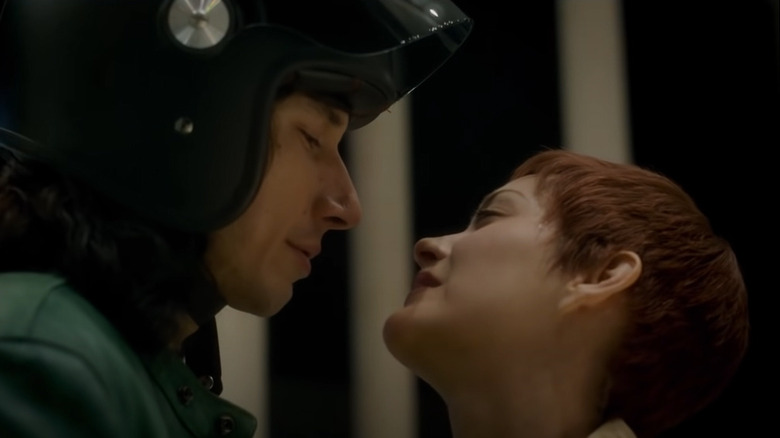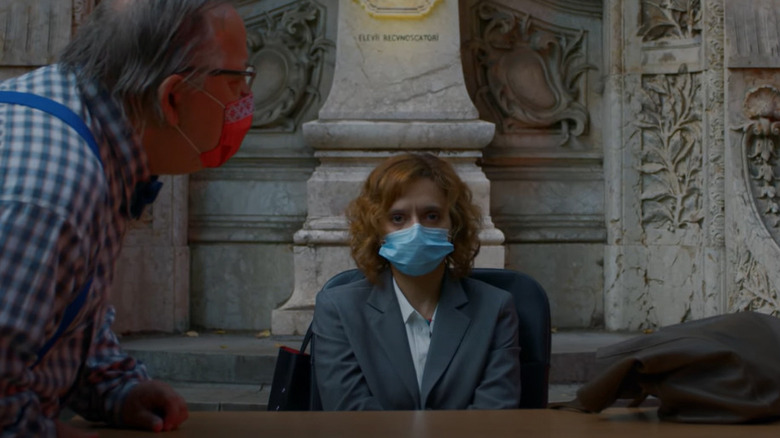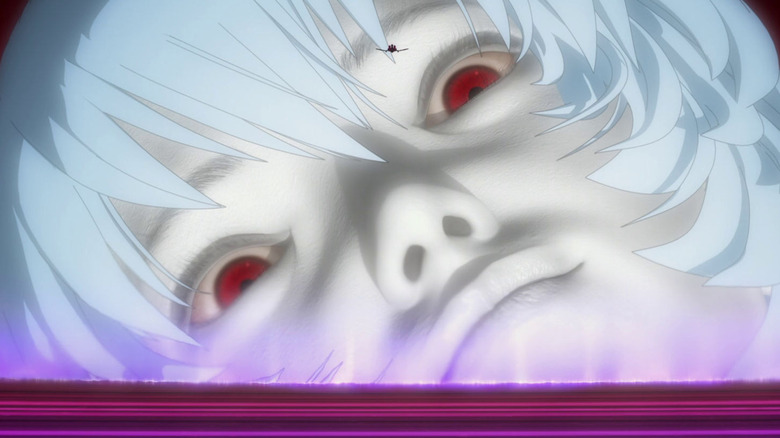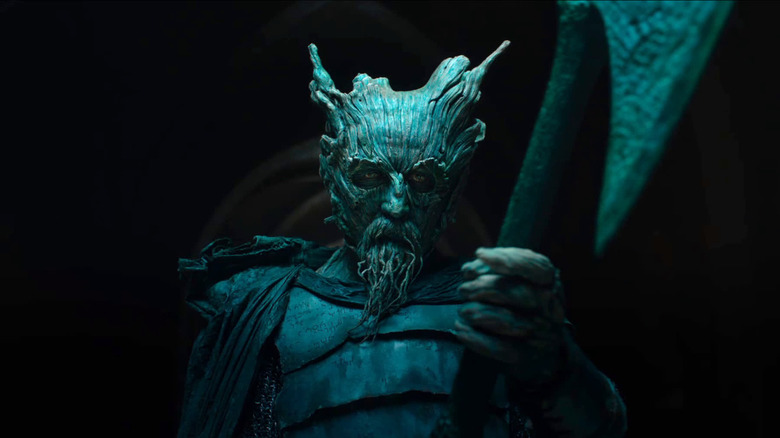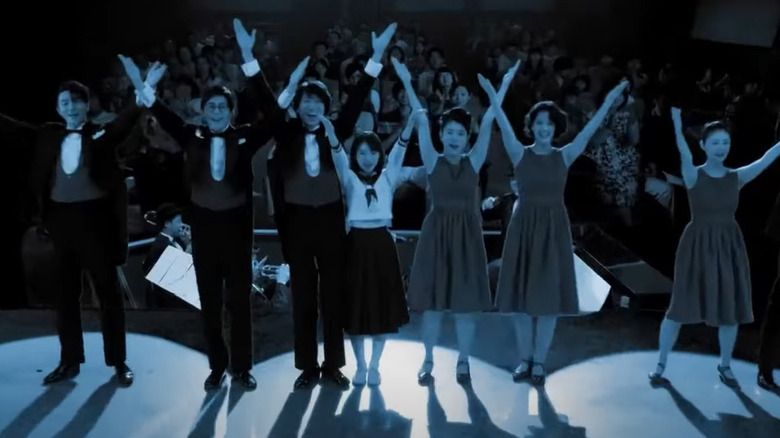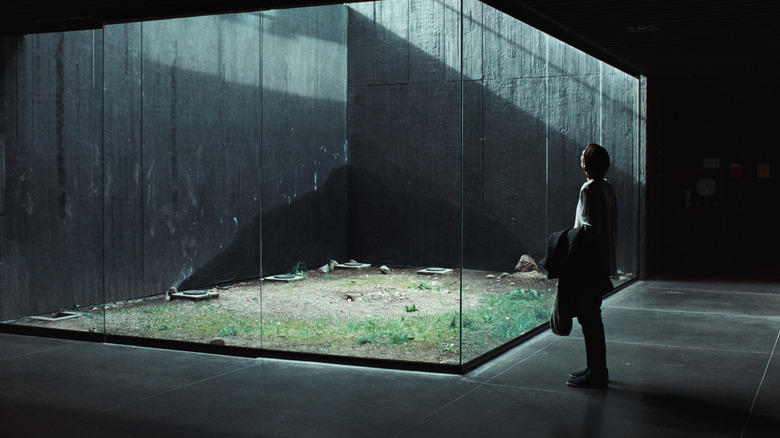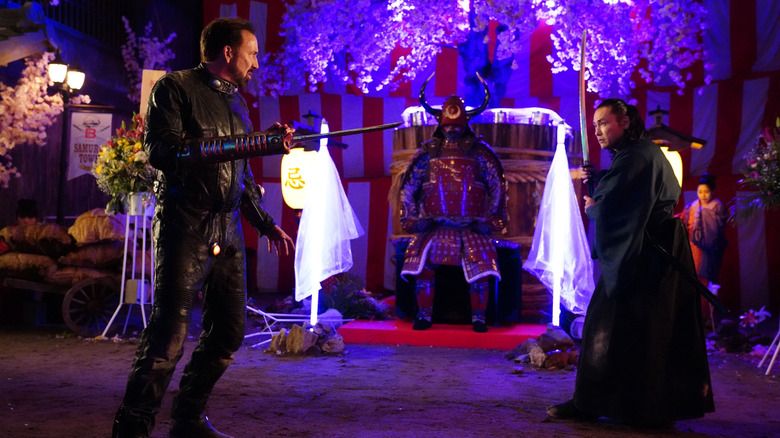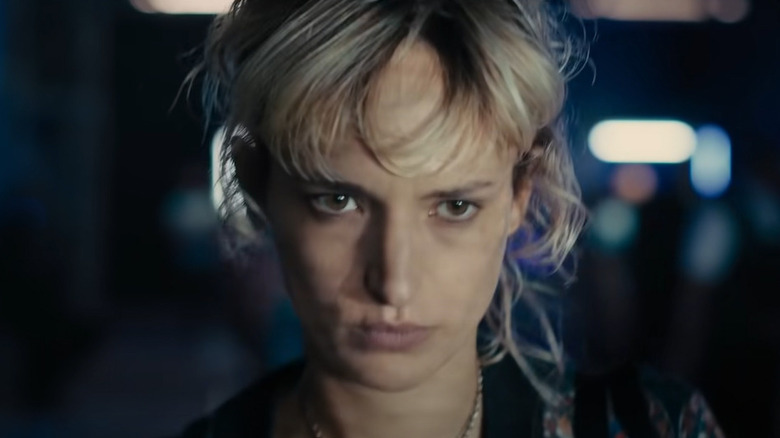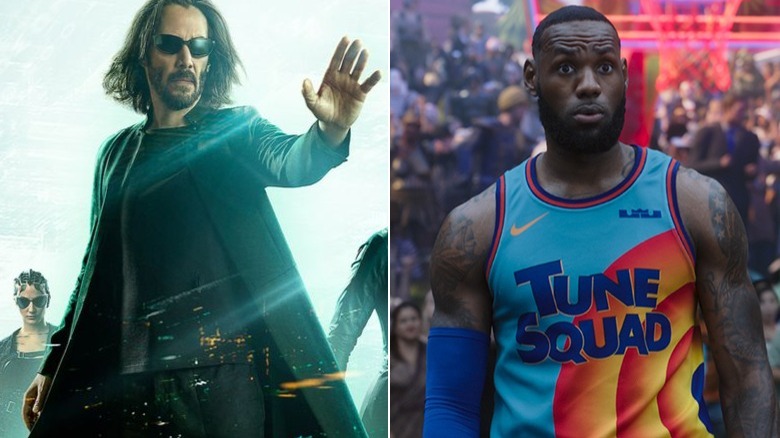The Weirdest Movies Of 2021
Life was pretty weird for movie fans in the year 2021. Though the COVID-19 pandemic marched on, altering cinema habits worldwide, the year also brought a flood of new films which reflected a sense of things being off. Conventional pre-pandemic release strategies were also challenged, which resulted in certain movies that would normally have had limited arthouse releases opening wide in multiplexes. This doesn't mean the crowds were there, but those who did make it into a screening definitely had a lot to talk about. Plenty of other films were released directly onto streaming platforms, where they were gobbled up by a bored populace. One way or another, this meant weird movies enjoyed the spotlight like never before.
In an effort to appreciate this unique year in cinema, we've decided to take a look at the weirdest movies of 2021. Judgment of these films' weirdness isn't a judgment of their quality, however. Some of the following movies are masterpieces, others are junk, and most are at varying points in between. From absurd anime and bizarre biopics to murderous musicals and strange sequels, these are 2021's most extreme cinematic oddities.
Aline
"Aline," released throughout Europe, Canada, Israel, and Japan in 2021 before making its way to the United States in 2022, could have been a traditional biopic, but several decisions it makes throws it straight into the realm of the bizarre. For one thing, though this movie is based on the life of Céline Dion and uses all of her hit songs (albeit sung by someone else), it doesn't use her name. Instead, its titular character, named "Aline Dieu," just happens to have the exact same life as Céline Dion. The singer's family does not approve of the movie, though Dion herself has yet to comment (via Montreal Gazette).
That's all weird enough in and of itself. But the thing that's really baffled audiences is the fact that director Valérie Lemercier plays Aline at every age — even as a 5-year-old! Lemercier is a comedian, so this might all be one big joke, but those who've seen the film often describe it as an oddly serious experience, despite its bizarre qualities. The Daily Beast even called it "a Will Ferrell movie without the jokes."
Annette
2021 was packed with movie musicals, ranging from the beloved ("Encanto," "West Side Story," "In the Heights," "Tick, Tick ... Boom!") to the questionable ("Music," "Dear Evan Hansen," "Cinderella"). One of the weirdest and most divisive of the bunch is "Annette," directed by Leos Carax from a screenplay and songs by the rock duo Sparks. Carax won the Best Director award at the Cannes Film Festival for this Brechtian drama, which follows a violently rage-filled comedian (Adam Driver) and his opera singer wife (Marion Cotillard).
"Annette" establishes its surrealism in the opening scene, in which a voiceover instructs the audience not to breathe for the duration of the movie and the filmmakers sing an apology for their limited budget. Yet even that might not prepare you for the title character, Driver and Cotillard's baby, who is presented as a creepy puppet not totally dissimilar from the infamous Renesmee doll deleted from "The Twilight Saga: Breaking Dawn — Part 2." The strangeness of this presentation, the repetition of the movie's songs, and the depths of toxic masculinity the story explores make for an alienating experience — but one that's also funny and emotionally powerful.
Bad Luck Banging or Loony Porn
The winner of the Golden Bear at the 2021 Berlin International Film Festival, Radu Jude's "Bad Luck Banging or Loony Porn" easily wins the race for best movie title of 2021. It's explained in the first five minutes of the film, when a graphic sex tape made by Romanian school teacher Emi (Katia Pascariu) and her husband is revealed. Emi's husband posts the recording online, and before long, it's everywhere. This leads to both bad luck and considerable looniness when Emi's identity is discovered.
After this shocking opening, the film's first act slows down considerably. We follow Emi around town as she prepares for a parent-teacher meeting, called on account of the scandal. The second act dispenses with narrative entirely in favor of an irony-heavy "dictionary of terms." The third act centers around the meeting, which becomes a series of wildly un-PC arguments, exposing the dark side of Romanian society. The film's ending is multiple choice, presenting three possible outcomes to the story. The third option is a joke so unexpected and hilarious, it elevates the entire movie.
Cryptozoo
Made by the husband-and-wife team of writer-director Dash Shaw and animator Jane Samborski, "Cryptozoo" is a rarity as an independent American animated feature film for adult audiences. Its hand-made aesthetic recalls psychedelic cartoons of the '60s and '70s like "Yellow Submarine" and "Fantastic Planet," yet "Cryptozoo" doesn't truly look like anything else out there — with the exception of Shaw and Samborski's previous feature, "My Entire High School Sinking into the Sea."
The story goes all-in on embracing the '60s vibe, presenting a struggle between well-meaning environmentalists trying to protect mythical creatures in a zoo and the government, which wants to use cryptids to destroy the hippie movement. While this is exactly as weird as you're imagining, "Cryptozoo" does include enough traditional action movie narrative beats that viewers won't be totally confused. Still, the strangeness of this film is present in every frame, making it stand out as a work of tremendous originality.
Evangelion: 3.0 + 1.01 Thrice Upon a Time
"Neon Genesis Evangelion" has been one of the most beloved yet controversial anime productions around since the original TV series premiered in 1995. Any expectations that the "Rebuild of Evangelion" movies were going to be a more commercial retelling of the story were shattered when the third film, 2012's "Evangelion: 3.0 You Can (Not) Redo," went all in on the franchise's infamous confusion and depression. Then, after years of delays, "Evangelion: 3.0 + 1.0 Thrice Upon a Time" was finally released in 2021. It serves as a conclusion not just to the "Rebuild" series, but to the entire "Evangelion" franchise.
Filled with overwhelming action, fourth wall-breaking meta-commentary, and unexplained mythological mysteries, "Thrice Upon a Time" shares much of the abstraction and strangeness of the TV series' ending and 1997's "End of Evangelion" movie. Yet it manages to coalesce into an even more satisfying narrative conclusion than either of its predecessors. The series' young heroes, who pilot giant robots of mysterious origin, face the apocalypse in this installment, as they have before — but the way to absolution is a new one. No American blockbuster even comes close to being this artsy, but "Thrice Upon a Time" made big money at the Japanese box office and became a major success on Amazon Prime Video.
The Green Knight
One of the most successful arthouse films of 2021, David Lowery's "The Green Knight" is a visually stunning take on the 14th century Arthurian poem, "Sir Gawain and the Green Knight." It's also far more faithful to the style and sensibility of its source material than other, more action-focused big-screen takes on the King Arthur mythos, resulting in a beguilingly unusual experience.
When the tree-like Green Knight challenges the knights of the Round Table to a "game" at Christmas, Gawain (Dev Patel) takes the stranger up on his offer and decapitates him. In return, the Green Knight gives Gawain his axe — on the condition that Gawain must be decapitated himself next year. Gawain's journey, filled with strange magic and sinful temptation, is a meditation on the nature of chivalry set amidst England's transition from paganism to Christianity. The original twist Lowery puts on the tale's ending only makes things even more mind-blowing and fascinatingly bizarre.
Labyrinth of Cinema
Nobuhiko Obayashi's 1977 horror-comedy "House" is one of the all-time classics of weird cinema, yet the rest of his filmography is hard to find outside of Japan. Fortunately, the late director's final feature film, "Labyrinth of Cinema," received an official American release in 2021, initially streaming on MUBI and later released in theaters and on Blu-ray via Crescendo House.
Running nearly three hours long, "Labyrinth of Cinema" packs in seemingly every last thing Obayashi wished to say through his art. Framed by a narrator aboard a fish-filled spaceship, the majority of the film follows three teenagers watching a war movie marathon at a closing theater. Soon enough, they jump into the various films they're watching. There are lots of comedic digressions and cheesy special effects, but also many serious messages about propaganda. Furthermore, the film's final hour offers some downright heartbreaking recollections of the bombing of Hiroshima. The opening narration states that the director "made this film for world peace." That earnest idealism holds strong throughout this unusual epic.
Lamb
From the Puritan paranoia of "The Witch" to the twisted cult of "Midsommar," indie distributor A24 has developed a reputation for releasing challenging art-horror movies that become beloved by critics and cinephiles. Even many film hipsters were initially baffled by the trailer for A24's big 2021 Halloween season release, however. "Lamb" follows a childless couple played by Noomi Rapace and Hilmir Snær Guðnason who raise a half-human, half-sheep creature as if it was their own child.
Depicting "Lamb" as another A24 horror movie is arguably misleading. Director Valdimar Johannsson objected to the description, saying, "Everyone says 'Lamb' is a horror movie. It's not!" (via Variety). It is, however, an arthouse fantasy film with a dark side, inspired by folklore and Johannsson's own sheep farming grandparents. Viewers are split on whether the lamb-child is more creepy or more cute, but critics generally agree that the film is an interesting slow-burn that treats its strange subject matter seriously.
Memoria
"Memoria," the latest experimental art film from Thai director Apichatpong Weerasethakul, is likely to remain the hardest film on this list for North American moviegoers to see. While the streaming service MUBI has licensed it in a handful of countries (and awards voters have received screeners), Neon's American release strategy is forgoing any streaming or commercial home video release. Instead, "Memoria" will play in one theater at a time for a brief engagement, before it moves on to the next location. Slowly, it will tour the whole country.
While some movie fans are doubtlessly frustrated with this unorthodox theatrical rollout, there is some logic to Neon's handling of "Memoria." Weerasethakul is known for making slow and strange films, but the story of "Memoria" is even harder to sell than his previous works — it's basically just about Tilda Swinton hearing loud sounds and traveling through the jungles of Colombia. The sound-focused nature of the film benefits heavily from the theater experience, as opposed to screenings via TV or computer.
Pompo: the Cinephile
"Pompo: the Cinephile" is an anime movie about the joy of making movies — one that just so happens to go very heavy on many of the most ridiculous anime tropes around. It takes place in "Nyallywood," which is basically Hollywood, but full of people who put the phrase "nya" in front of everything ("nya" is the Japanese equivalent of "meow"). The title character is a little girl (or possibly an adult who just looks like one?) who produces exploitation films and makes copious inappropriate comments. The film follows her and her crew as she decides to make a serious, Oscar-bait drama.
The portrayal of the film industry offered by "Pompo: The Cinephile" is high on passion, but extremely low on anything resembling realism. Every aspect of making Pompo's movie, from the directing to the editing to the financing, is handled in the most ridiculous possible way. There are plenty of laughs to be had within this bizarre filmmaking fantasia, though it's not always clear which ones are intentional.
Prisoners of the Ghostland
"Pig," the most critically acclaimed film of Nicolas Cage's acting career, surprised audiences with how relatively not weird it is. Sure, the first act looks like "John Wick" with a pig and features a truly strange sequence involving a fight club for chefs — but after that, it settles into being a realistic drama about grief and empathy, led by an unusually subdued Cage performance. It's still a quirky film, with all its tonal shifts, but those looking for truly gonzo Cage a la "Mandy" or "Color Out of Space" won't find that sort of weirdness in "Pig."
However, they will find it in "Prisoners of the Ghostland," the first English-language film from prolific Japanese director Sion Sono. Based on the script, Cage described it as "the wildest movie I've ever made." The finished product, in which Cage plays a bank robber in post-apocalyptic Samurai Town forced to fight ghosts after having bombs strapped to various body parts, lives up to the hype. Don't go in expecting anything to make sense, though you'll assuredly enjoy the East-meets-West art design.
Titane
IMDb's summary for Julia Ducournau's "Titane," winner of the Palme d'Or at the 2021 Cannes Film Festival, reads, "Following a series of unexplained crimes, a father is reunited with the son who has been missing for 10 years." Technically, this summary is accurate, if we're only accounting for one character's unreliable perspective. But to anyone who's seen "Titane" and knows how much weirder and more memorably disturbing it gets, this synopsis is kind of hilarious.
Filled with graphic body horror, a chillingly amoral protagonist, and unforgettable usage of automotive vehicles, "Titane" is horror so extreme, it's caused multiple viewers to faint. It also happens to be an oddly sensitive story about grief, love, and gender identity, and one in which a woman is literally impregnated by a car. France made the critically-acclaimed midnight movie its official submission for the best international feature Oscar, though it failed to make the Academy's shortlist (via Deadline). Forget being the weirdest film of 2021 — "Titane" might belong on a list of the weirdest films of all time.
The Matrix Resurrections and Space Jam: A New Legacy
In 2021, Warner Bros. released not one, but two sequels to decades-old blockbuster movies ... that happen to be about Warner Bros. demanding sequels to decades-old blockbuster movies. Both of these meta-sequels take place primarily in virtual reality, and they both borrow a surprising number of plot points from Steven Spielberg's Peter Pan movie, "Hook." The two films in question are "The Matrix Resurrections" and "Space Jam: A New Legacy," and they're as bizarre as they are headline-making.
Which of these two movies is the weirder one depends on what sort of weirdness you're focusing on. "The Matrix Resurrections" is weird the way an ambitious and intellectual artist's passion project is weird. Lana Wachowski returns to her famously mind-bending franchise with a deeply personal story that is, in part, about the pressures of trying to write a sequel. In contrast, "Space Jam: A New Legacy" is weird in the way a computer algorithm gets weird. Its shameless corporate product placement results in such strange spectacle as seeing the droogs from "A Clockwork Orange" show up in a children's film, and Bugs Bunny literally dying.


